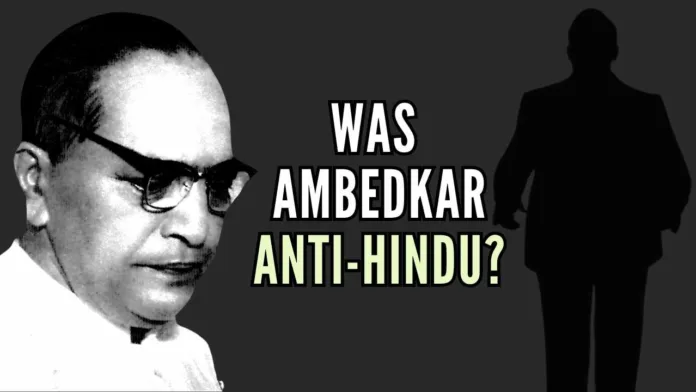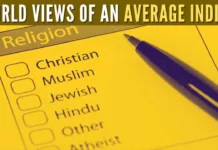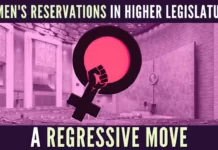
Remembering Dr. B R Ambedkar
This world cannot be seen in black and white.
It is colourful.
What does colour mean?
It is a combination of shades – hue, saturation, and brightness.
Like the world, people also can’t be seen as black or white.
But somehow, the material world we live in has been made bipolar. I have to be good or bad, rich or poor[1], educated or uneducated, cosmopolitan or a village bumpkin. We thrive in segmenting everything we come across as this or that.
This thinking has been so deeply embedded into our contemporary narrative that we can’t find fault with certain national leaders. The shame is that we have a list of approved leaders with whom we can never find fault, and the other end of the spectrum is where we have leaders with whom there shouldn’t be any redeeming factors or good things to discuss.
The other difficulty is that we also have a prescription about how we should see these approved leaders—the nation’s architects, pioneers of modern India, blemishless perfect humans, etc. This prescription gets more problematic when certain leaders are only approved as Dalit leaders or people who reformed a ‘certain’ section of society or are shamefully presented as an anti-Hindu trophy. You are not allowed to see beyond this characterization.
Babasaheb Bhimrao Ambedkar is a giant who has been constricted and seen as a Dalit leader who fought Hinduism’s hegemony.
Now, this is not just problematic but is a way of dwarfing the great leader and making him just a photograph or statue to be garlanded twice or thrice[2] a year. Or a name taken when you need a crutch to support your abuse of Sanatana Dharma.
A section that claims sole proprietorship[3] to Babasaheb’s legacy paints a sad picture that belittles the great man’s legacy as just the leader of one section of people and a Hinduphobe. That is why it is important for us to study Babasaheb’s history and works, bring out the true story, and end the sole proprietorship ‘enterprise’ of certain vested interests[4].
Bhimrao Ramji Ambedkar was born on April 14, 1891, in the military cantonment of Mhow. His father was a Junior Commissioned Officer in the British Indian Army – Subedar. Ramji Maloji Sakpal and his mother, a homemaker, Smt. Bimabhai Sakpal.
While Sakpal was his original surname, his father registered the surname as Ambadawekar[5]. It was his Brahmin teacher at school, Krishnaji Keshav Ambedkar, who changed his surname to Ambedkar.
Ambedkar faced many problems during childhood, especially at school, because of the untouchability that prevailed then. His academic brilliance and depth of knowledge overcame all these impediments and shined like the bright sun on a gloomy day. He got a sponsorship established by Maharaja Sayajirao Gaekwad III of Baroda to do his post-graduation at Columbia University in New York, USA. He also got his Ph.D. in economics from the same university.
Dr Ambedkar had problems with certain practices prevalent in Hinduism during that time. And he fought against them, tooth and nail. But that doesn’t make him an anti-Hindu. He did what he did because he wanted to reform his home, not because he wanted its destruction. It is disheartening to see vested interests misuse his legacy. This results in nothing but discrediting his great contributions to nation-building. And paint him in a corner as a ‘Dalit’ leader who was vehemently anti-Hindu.
Let us look at a few instances from Babasaheb’s life and shine a light on the Hindutva Ambedkar:
- On cow protection, Babasaheb says[6], ‘Islamic law doesn’t insist upon the slaughter of the cow for sacrificial purposes and no Musalman, when he goes to Haj, sacrifices the cow in Mecca or Medina.’
- On the need for stoppage of music before Mosques, he says[6], ‘Music before mosque is played in all Muslim countries without any objection. Even in Afghanistan which is not a secularized country, no objection is taken to music before Mosque. But in India, the Musalmans must insist upon its stoppage because the Hindus claim a right to it.’
- On the Moplah Genocide, he says[6], ‘The Hindus were visited by dire fate at the hands of the Moplas. Massacres, forcible conversions, desecration of temples, foul outrages upon women, such as ripping open pregnant women, pillage, arson, and destruction – in short, all the accompaniments of brutal and unrestricted barbarianism, were perpetrated freely by the Moplas on the Hindus until such time as troops could be hurried to the task of restoring order through a difficult and extensive tract of the country. This was not a Hindu-Muslim riot. This was just Bartholomew[7].’
- More on the Moplah Genocide[6], ‘The blood-curdling atrocities committed by the Moplas in Malabar against the Hindus, were indescribable. All over Southern India, a wave of horrified feeling had spread amongst the Hindus of every shade of opinion, which was intensified when certain Khilafat leaders were so misguided as to pass resolutions of congratulations to the Moplas on the brave fight they were conducting for the sake of religion. Any person could have said that this was too heavy a price for Hindu-Muslim unity. But Mr Gandhi was so obsessed with the necessity of establishing Hindu-Muslim unity that he was prepared to make light of the doings of the Moplas and the Khilafatists who were congratulating them. He (Gandhi) spoke of the Moplas as the brave God-fearing Moplas who were fighting what they considered as religion and in a manner they considered as religious.’
- The communal award created separate electorates for the depressed classes, Muslims, Sikhs, Indian Christians, Anglo-Indians and Europeans. Ambedkar thought that the Congress was unfair to the Hindus to appease the Muslims[8], ‘The Communal Award is iniquitous inasmuch as it accords unequal treatment to the Hindu and Muslim minorities in the matter or electorates. It grants the Muslim minorities in the Hindu provinces the right of self-determination in the matter of electorates, but it does not grant the same right to the Hindu minorities in the Muslim provinces. In the Hindu provinces, the Muslim minority is allowed to choose the kind of electorates it wants and the Hindu majority is not permitted to have any say in the matter. But in the Muslim provinces, it is the Muslim majority that is allowed to choose the kind of electorates it prefers and the Hindu minority is not permitted to have any say in the matter. Thus, the Muslims in the Muslim provinces having been given both statutory majority and separate electorates, the Communal Award must be said to impose upon the Hindu minorities Muslim rule, which they can neither alter nor influence.’
- On Congress’ Muslim appeasement policies, he says[6], ‘Appeasement means to offer to buy off the aggressor by conceiving at or collaborating with him in the rape, murder, and arson on innocent Hindus who happen for the moment to be the victims of his displeasure. On the other hand settlement mean slaying down the bounds which neither party to it can transgress. Appeasement sets no limits to the demands and aspirations of the aggressor. Settlement does. The second thing the Congress has failed to realize is that the policy of concession has increased their aggressiveness and what is worse the Muslims interpret these concessions as a sign of defeatism on the part of the Hindus and the absence of will to resist. This policy of appeasement will involve the Hindus in the same fearful situation in which the Allies found themselves as a result of the policy of appeasement which they adopted towards Hitler.’
Many of us know about Swatantra Veer Savarkar’s work to abolish untouchability. He was also at the forefront of enacting legislation outlawing untouchability. Finally, Article 17 of the Indian Constitution was drafted by Dr Ambedkar. Not many know about the love and respect the two great men shared. Here is Veer Savarkar’s tribute to Babasaheb[9], ‘When it was revealed that slavery would be abolished in America, millions of Americans took up arms against the government. After the Civil War, the abolition of slavery was imposed as a condition of surrender. The declaration of the abolition of untouchability has not been forced on us; no one has been persuaded to do so as a condition of refuge. It is self-motivated atonement by Hindus for the well-being of the nation. The Constitution Assembly had representatives of all the provinces and of all the castes, and the bill received support from all over the country. On top of that, the ‘Manu’ of this new Smriti (code) was a Mahar. ‘Maharashtra Kulbhushan’ Dr Ambedkar. This is a unique capacity for the reforms inherent in the Hindu race.’
Babasaheb Dr Ambedkar was close friends with Dattopant Thengadi of RSS. In fact, Babasaheb appointed Sri Thengadi as his election agent for the 1954 by-election for the Loksabha seat of Bhandara. It requires a lot of trust and goodwill to be appointed a candidate’s polling agent, and it looks like Babasaheb had that on Sri Thengadi. The Brahmin, Dattopant Thengadi, was appointed General Secretary of the Scheduled Caste Federation[10], which Dr Ambedkar had created. When a group of Dalit leaders grudged this appointment and complained to Babasaheb, he was reported to have said, ‘The day any of you becomes a bigger Dalit than Thengadi, I will make you general secretary of the Federation.’ Such was his trust and affection for the RSS Pracharak, Dattopant Thengadi.
Babasaheb also had a positive opinion of RSS, which was shaped by his visit to an RSS camp in 1939. He was thoroughly impressed by the culture of equality that Sangh preached and practiced.
Every morning in Shakas and Karyalayas across the country, the RSS Swayamsevaks recite a Prarthana—Ekatmata Stotra, or the Song of Unity. This 33-Shloka prayer celebrates and praises Bharata, its physical features, great leaders, and Yatis.
Here is what Shloka 30 says:
सुभाषः प्रणवानन्दः क्रान्तिवीरो विनायकः
ठक्करो भीमरावश्च फुले नारायणो गुरुः ॥
Netaji Subhash Chandra Bose, Swami Pranavaananda, Vinayak Damodar Savarkar, Thakkar Bappa, Bhim Rao Ambedkar, Mahatma Jyoti Rao Phule and Narayana Guru.
Let us, therefore, not get swayed by the one-sided narrative about an anti-Hindu Babasaheb. It is far from the truth of the colossus he was. To paint him on one or the other extreme of a bipolar narrative is doing injustice to the man who was talking about justice and equality his whole life.
Let us start celebrating the true Babasaheb Dr Ambedkar and follow in his footsteps to recreate a just and great Bharata.
PS: Not many people know that in 1956, Dr Ambedkar started the Training School for Entrance to Politics. Imagine an India where many graduates from that school were in parliament.
Notes and references:
[1] I once introduced myself as from a higher middle-class household to someone. He dismissively responded, “Oh, a rich guy who thinks he isn’t rich enough?”
[2] Babasaheb is a little luckier than some others. He also has Dhammachakra Pravartan Diwas. The day when, according to this section of people “who approve and dole out the prescription” of who is a leader and how are you are supposed to look at him, Ambedkar “denounced” Hinduism and “converted” to Buddhism.
[3] There are dirty stories about how this certain section gets rowdy and violent when someone else even wants to pay a floral tribute to Babasaheb. Here is an example from Tamil Nadu.
[4] “Othering” refers to the process whereby an individual or groups of people attribute negative characteristics to other individuals or groups of people that set them apart as representing that which is opposite to them.
[5] His family originally were natives of Ambadawe village in Ratnagiri district of Maharashtra.
[6] B.R. Ambedkar, Thoughts on Pakistan, Source: Online
[7] Bartholomew was one of the twelve apostles of Jesus. According to an account, he was skinned alive and beheaded.
[8] B.R. Ambedkar, Pakistan or the Partition of India, Samyak Prakashan. 2013
[9] Uday Mahurkar and Chirayu Pandit, Veer Savarkar, Rupa, 2021
[10] ThePrint, Source: Online
Note:
1. Text in Blue points to additional data on the topic.
2. The views expressed here are those of the author and do not necessarily represent or reflect the views of PGurus.
For all the latest updates, download PGurus App.
- Chavadi Arunachalam Pillai – Another hero the curtain never revealed - April 27, 2024
- Was Ambedkar anti-Hindu? - April 14, 2024
- V. V. S. Aiyar – The ‘all-rounder’ Maharishi who gave it all for Bharat Mata - April 2, 2024










